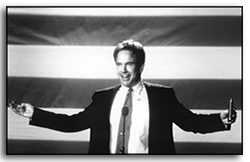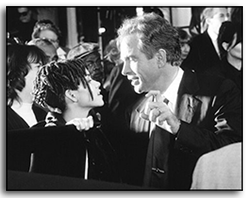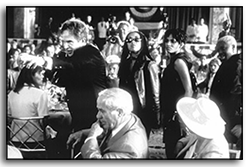

Charlyne Gelt Ph.D.
Connections!
Upcoming Events
Chapter News
Barbara Calvi,
President
Read
Shawn LaRé Brinkley,
Editor
Read
April 2017
Membership Meeting
Review
Read
Contributing Articles
from Members
and Friends
Charlyne Gelt
Cinema Therapy
Natalie Jambazian
Best Practices
Read
Monica McGarva
Member Profile
Read
Our Sponsors and
e-Blast Advertisers
Read
Contact Us
Read
Cinema Therapy by Charlyne Gelt, Ph.D.
Bulworth
In many ways, the 1998 film BULWORTH, written, produced, directed by — and starring —
Oscar-winner Warren Beatty, fits right in with today's political scene. The story dramatizes (in satirical fashion) the roiling internal conflicts of a liberal Kennedy-like U.S. Senator from California, Jay Billington Bulworth, who is running for re-election in an increasingly conservative environment. Bulworth, fallen from grace in the eyes of his constituents, is considered out-of-date.
 Disillusioned with political spin, banalities, platitudes, and clichés, Bulworth is depressed to the point of feeling suicidal. On top of all that, his marriage to Constance (Christine Baranski) is a sham, his finances are in a shambles, and he has come to hate his work. He's in the midst of a nervous breakdown and ready to throw in the towel.
Disillusioned with political spin, banalities, platitudes, and clichés, Bulworth is depressed to the point of feeling suicidal. On top of all that, his marriage to Constance (Christine Baranski) is a sham, his finances are in a shambles, and he has come to hate his work. He's in the midst of a nervous breakdown and ready to throw in the towel.
Believing his political career is over and that he is about to suffer a humiliating political defeat, Bulworth comes up with a bizarre solution: He negotiates a ten-million-dollar life insurance policy on himself and then hires an assassin to kill him in three days. He believes this tactic will end his misery — and leave his daughter well-provided for.
Like his political career, Bulworth, the man, is lost. Ironically, his decision to die fills him with new-found courage. He becomes bluntly honest with his voters on the campaign trail, perhaps for the first time in his political career. Wherever he appears, he speaks the truth — using hip-hop rhythms and rap. When questioned by a captivated fan in one audience, "Why don't we have national health care like every other first world country?" Bulworth truthfully explains, "Because of insurance payoffs." His free-wheeling, potentially offensive remarks, make him an instant media success and re-energize his campaign while at the back of his mind is his impending assassination.
In one telling scene, Bulworth arrives at LAX, fueled with alcohol and high as a kite, to finish the last weekend of speeches and fundraising campaigning before the primary election! Speaking at an African-American church in South Central L.A., the despondent Bulworth can no longer bring himself to recite the words, "America is standing on the doorstep of a new millennium." Instead, he discards his prepared speech, and then improvises truthful remarks instead of the familiar rhetoric. He startles both the audience and his campaign manager, Murphy (Oliver Platt). A C-SPAN film crew, now following his reinvigorated campaign, reports on every one of his loose-cannon salvos; which gain the favorable attention of a very attractive young activist, Nina (Halle Berry). She begins to tag along on the campaign. It seems that now everybody wants a piece of this new-found personality. For Bulworth, this is an exhilarating new experience. He is also pursued by the paparazzi, his insurance company, his campaign managers, and a growing fan-base, from gang members in the ghettos to celebs in Beverly Hills.
 When Bulworth falls in love with the beautiful and ever-present Nina, it reconnects him with the disenfranchised, his core values, and restores his will to live. He wins the primary election by a landslide, and then accepts a new campaign for the presidency. Elated at his triumph, he tries to call off the hit — but the gears have been set in motion. His new-found life is destined to be short-lived. At the end, while speaking to a crowd of reporters and supporters, Bulworth is shot. The shooter is an agent of the insurance company lobbyists.
When Bulworth falls in love with the beautiful and ever-present Nina, it reconnects him with the disenfranchised, his core values, and restores his will to live. He wins the primary election by a landslide, and then accepts a new campaign for the presidency. Elated at his triumph, he tries to call off the hit — but the gears have been set in motion. His new-found life is destined to be short-lived. At the end, while speaking to a crowd of reporters and supporters, Bulworth is shot. The shooter is an agent of the insurance company lobbyists.
Psychological Implications
If you have ever felt sorely stuck, soul dead, felt that you've missed the boat and that life has lost its meaning or passed you by; then BULWORTH may be a movie you can relate to. Warren Beatty's character is miserable with his life, his marriage, and his political career. Bulworth uses alcohol and drugs to deny and ward-off the torture he lives inside the shell of a 3-piece suit. In the confines of a senator's life, he masks his depressed state to protect himself from feeling overwhelmed while losing a toe-hold on his job and a fragile sense of self. He must die one way or another. Like many who have hit an emotional bottom while still looking put-together, he uses alcohol and drugs to numb his pain. It helps mask his depression and protects him from feeling overwhelmed. Such masks, unfortunately, also prevent him — and others like him — from living in the full force of their aliveness. Bulworth fears the process of removing his mask, fears the unknown, and isn't ready for the emotional heroics called for when one wants to change.
 At the same time, Bulworth recognizes some seriously disturbing middle-age angst that can no longer remain walled-off. Though depressed and miserable, this state of mind has become a comfortable shoe. He is living an unlived life. But rather than face change, he chooses to arrange to die — and only then does he get a whiff of what living life to the fullest really means. When he figures it all out, it is too late!
At the same time, Bulworth recognizes some seriously disturbing middle-age angst that can no longer remain walled-off. Though depressed and miserable, this state of mind has become a comfortable shoe. He is living an unlived life. But rather than face change, he chooses to arrange to die — and only then does he get a whiff of what living life to the fullest really means. When he figures it all out, it is too late!
While the film is really a spoof about the Washington political scene — power, greed, corruption and disingenuousness — it also reveals many psychological gems, such as how truth-telling can be freeing, and what positive responses can occur when we take off our masks. Because, in reality, we all wear masks, or a social persona. And like Bulworth, we are fearful of letting anyone see the real us, or see what is hidden behind closed doors. Even in its milder expression — as people-pleasers — we are still smiling to cover up our own anxiety or fear of rejection if we dare show our "truth." It takes courage to do that, which is what many discover when they enter therapy.
Bulworth encourages us to read between the lines, to question our perspective on life, to look back at what we can change to make us feel fully alive each day, like dysfunctional patterns, obstacles that push up like blocks and cause angst. BULWORTH is a film that leads us to question our own masks: When do you put on a game-face or hide behind a façade? What do you think would happen if you didn't do that? What could you change to feel more alive? The "suicide" theme in BULWORTH can be understood as a metaphor for "something within us that needs to die" in order for us to feel alive again. What is it within you that "needs to die" before you can really live?
 Psychological wounding in childhood can create blockages in our bodies that sabotage us from receiving the full flow of our life force. It can manifest as fatigue, confusion, fear, anxiety, or depression. For Bulworth, his depression and anxiety represent the death of the soul. Something must give! Unmasked, he is freed from all the "shoulds." What gets unearthed reveals a transformation, a sense of connection, belonging, wholeness and aliveness. He becomes fueled with life energy that transforms him into a real person who earns acceptance with his "truth." His story crafts a message that can resonate with those who believe themselves stuck, pushed-up against a wall, and afraid to leave the safety of the shore. His decision to die allows him to access his hunger for life, and to have an experience of life (J. Campbell).
Psychological wounding in childhood can create blockages in our bodies that sabotage us from receiving the full flow of our life force. It can manifest as fatigue, confusion, fear, anxiety, or depression. For Bulworth, his depression and anxiety represent the death of the soul. Something must give! Unmasked, he is freed from all the "shoulds." What gets unearthed reveals a transformation, a sense of connection, belonging, wholeness and aliveness. He becomes fueled with life energy that transforms him into a real person who earns acceptance with his "truth." His story crafts a message that can resonate with those who believe themselves stuck, pushed-up against a wall, and afraid to leave the safety of the shore. His decision to die allows him to access his hunger for life, and to have an experience of life (J. Campbell).
Many psychologists believe that change can occur in the relatedness to another person. In this case, when Bulworth falls in love with Nina, he experiences a feeling of aliveness. He gets excited about life, is buzzed with energy without booze or drugs, charged up by his new relationship with himself, his new love, and he looks at his life differently. Externally, nothing has changed; internally, his perceptions have changed. It's the life force energy which Freud referred to as libido.
Charlyne Gelt, Ph.D. (PSY22909) is a clinical psychologist who practices in Encino. She leads Women's Empowerment Groups that help women learn the tools to move beyond self-destructive relationship patterns. She may be reached at 818.501.4123 or cgelt@earthlink.net. Her website is www.drgelt.com. Her office address is 16055 Ventura Blvd. #1129 Encino, CA 91436.